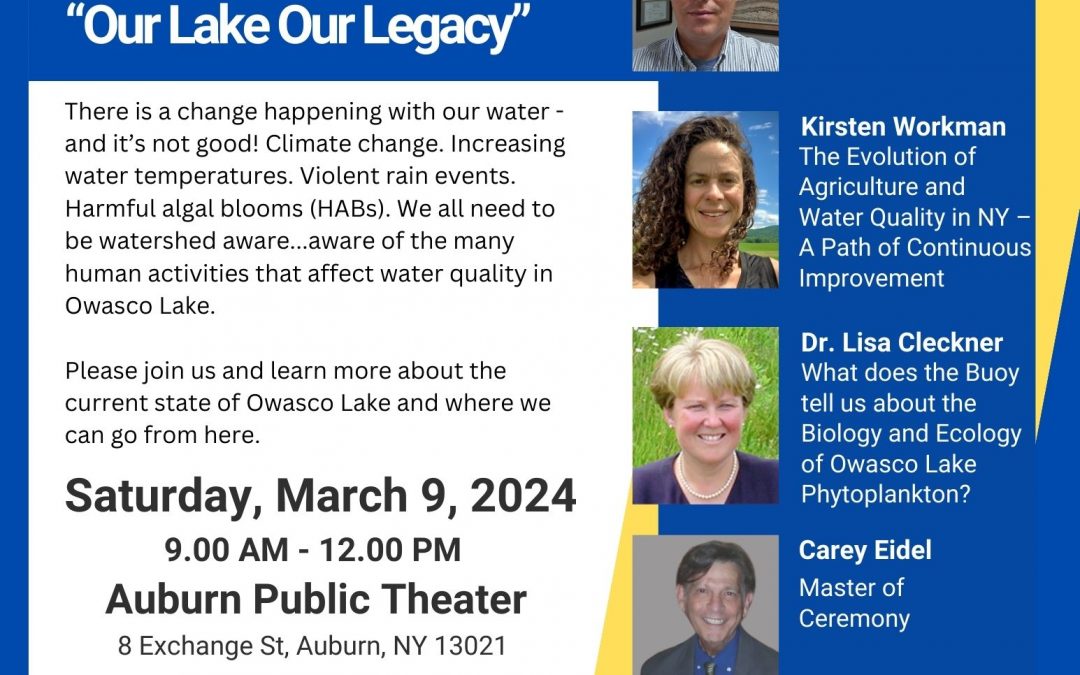We all miss the community leadership and knowledge Bob Brower so willingly contributed to the betterment of our region. He was a mentor to many, patiently explaining Owasco Lake’s behavior and its dependence on the health of its surrounding large watershed. Each year since Bob’s passing, we have commemorated him with a scientific symposium at which experts present and explain “in plain English” important research and findings about the lake and/or its watershed.
On Saturday, March 9, 2024, five speakers offered Owasco Lake and watershed research and observational findings. The Symposium was held at the Auburn Public Theater (APT) and online via Zoom. Carey Eidel, Director of Finance and Grants at the APT, served as Master of Ceremonies welcoming everyone to the event and introducing each speaker. Approximately 50 people attended in person and another 60 participated online.
Ken Kudla and Julie Lockhart led off the presentations. They and their families are long term lakeside residents. Ken and Julie reminded everyone of the unique freshwater resource we all are fortunate to live near. Owasco Lake and the other ten Finger Lakes are part of the Great Lakes basin. Some 21% of the world’s accessible freshwater is in the Great Lakes basin. That is 95% of the accessible fresh water in the United States! Ken and Julie emphasized that we all live in multiple watersheds: that of Owasco, Lake Ontario, and even larger, the overall Great Lakes. We were reminded that we all have responsibilities to be good watershed stewards whether immediate lakeside residents or residents some distance from a waterbody itself. We must be mindful of what we do on the land because much of our activities contribute to compounds of phosphorus and nitrogen and/or sediment that wash down streams or is deposited from the air into a waterbody. The website https://www.flrwa.org/lake-friendly-living is a ready resource of advice.
The attendees welcomed Seth Jensen as the Symposium’s second speaker. Seth is the Director of Municipal Utilities for the City of Auburn NY. He and his staff are responsible for providing safe drinking water to more than 45,000 residents of Auburn and many outlying districts. Seth is a 2005 SUNY ESF graduate holding a Bachelor of Science degree in Environmental Resource Engineering. Seth pointed out that Owasco Lake is a great source of fresh raw water. Turbidity is usually low. The lake’s limestone bedrock provides very good pH. Taste and odor are generally very acceptable. The powdered carbon filtration system installed six years ago continues to remove soluble microcystin. Seth underscored the importance of preserving or installing buffers along waterways and of not fertilizing or applying pesticides close to water.
Kirsten Workman is a nutrient management and environmental sustainability specialist with Cornell CALS PRO-DIARY. Kirsten discussed the role of NY agriculture in environmental stewardship and the progress the dairy farmers in our state have made to adopt water quality practices. She shared the importance of science to that work and shared some recent data looking at the nutrient (N, P, K) balances for NY state, counties and individual farms. She and her colleagues strive to work with farmers to maximize the benefit of nutrient applications, especially manure, to agricultural land, thus reducing the need for commercial fertilizer.
The Symposium also was pleased to welcome Dr. Lisa Cleckner, Director of the Finger Lakes Institute (FLI) located at the Hobart and William Smith Colleges in Geneva NY. Dr. Cleckner presented some of the recent findings from the instrumented buoy the FLI operates in Owasco Lake. The FLI buoy is resident on the lake from April to November. A sonde is lowered twice every 24 hours. It measures several parameters every 1.5 meters from the surface to the lake bottom and reports its measurements back to the lab at FLI. These measurements include temperature, salinity, and oxygenation.
Questions were welcomed from those physically in the APT and online. Time prevented answering all of the questions during the symposium. OWLA is preparing a detailed response to each.
For more information, or to join OWLA please go to our website, owla.org.

Recent Comments